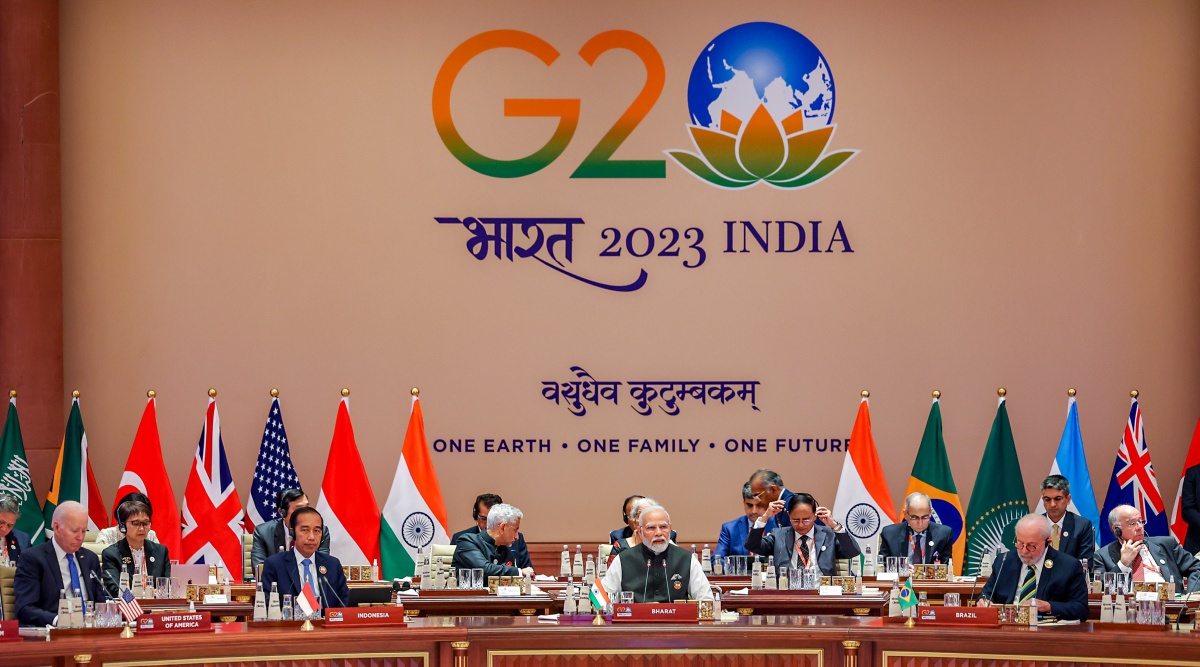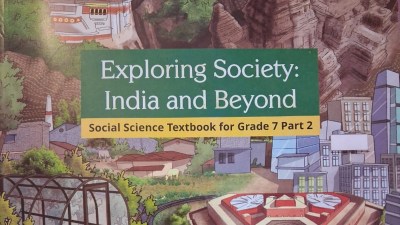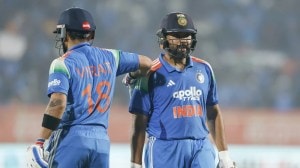As the curtains fell on the G20 Summit Sunday, the consensus arrived in the G20 New Delhi Leaders’ Declaration set the stage for the diplomatic and political conversation on the Russia-Ukraine conflict with a hope — across the spectrum — that the text is expected to set the tone for any negotiations between the two warring sides: the West-led G7 grouping that is backing Ukraine, and Russia, which has Beijing’s support in the form of a no-limits friendship.
The consensus text “enables us to look ahead to what should be the solution for a just and lasting peace at the end of the war in Ukraine,” a G7 official said.

The Indian Express spoke to officials from several member states to find that behind the hectic negotiations that went into the joint communique, lay hard work to build common ground and articulate a formulation acceptable to all.
 Prime Minister Narendra Modi during Session-2 on ‘One Family’ of the G20 Summit 2023 at the Bharat Mandapam, in New Delhi, Saturday, Sept. 9, 2023. (PTI)
Prime Minister Narendra Modi during Session-2 on ‘One Family’ of the G20 Summit 2023 at the Bharat Mandapam, in New Delhi, Saturday, Sept. 9, 2023. (PTI)
What framed the challenge was the fact that the two paras in the Bali declaration lay shattered within a month of the November 2022 G20 Summit, the sense being that these, by echoing the UN resolutions — where India had abstained — deploring Russian aggression, were “divisive” and “divergent.”
Bali had recorded the G7 position of condemnation of the war in Ukraine and the Russian position on unilateral sanctions. It had the West’s formulation on the war’s impact on the global economy but also factored in the Russian-Chinese stance that G20 is an economic forum that does not discuss security issues.
It did acknowledge the impact of security on the economy but also flagged the UN charter on dialogue and diplomacy and the phrase that “today’s era must not be of war.”
The Delhi declaration needed a “completely new language,” said an official closely involved in the process. “We needed a text that had something for everyone so that each member can go back with a win.”
Story continues below this ad
In almost 200 G20 meetings across 50 locations, the G7 pushed for a maximalist language in its criticism of Russia. And Russian interlocutors would look at China, which stood up for its “no-limits friendship”. So sharp was the divide that the two sides refused to get photographed together at every G20 meeting.
 Indian Prime Minister Narendra Modi appears on a screen as he attends “Session II: One Family” at the G20 summit in New Delhi, India, Sept. 9, 2023. (AP/PTI)
Indian Prime Minister Narendra Modi appears on a screen as he attends “Session II: One Family” at the G20 summit in New Delhi, India, Sept. 9, 2023. (AP/PTI)
New Delhi decided, therefore, to reach out to each member individually and separately, which took hours of painstaking conversation to get a sense of each one’s red lines. Russia and China, sources said, were almost always on the same page: they did not want mention of Russian aggression or condemnation of the war in Ukraine.
The G7 grouping wanted a reference to UN resolutions, mention of “war and territorial expansionism” and the pointed phrases: “sovereignty and territorial integrity of States must be respected”, and “just, and durable peace in Ukraine”.
New Delhi made the “voice of Global South” the fulcrum of the argument, and first roped in Brazil, the next host in 2024. The Brazilians were the most active and supportive partners. Later, the South Africans joined in, since they are the hosts in 2025. These three, along with the last host Indonesia, became a team, and worked on each of these negotiating teams.
Story continues below this ad
At the political level as well, there was outreach to leaders from both sides —Modi spoke to Putin and Jaishankar met Lavrov; South African President Cyril Ramaphosa spoke to Chinese President Xi Jinping and Brazilian Foreign Minister Mauro Vieira spoke to his Russian counterpart Sergey Lavrov.
There was consensus on two aspects. One, the G20 is the last working and functioning global forum, and it should not go the UNSC way where veto power has blocked any movement and the body has effectively collapsed. And, two, the Global South was most adversely hit by the consequences of the war.
 The declaration agrees on a “WHO-managed framework to build a comprehensive digital health ecosystem in compliance with respective data protection regulations”. (PTI Photo)
The declaration agrees on a “WHO-managed framework to build a comprehensive digital health ecosystem in compliance with respective data protection regulations”. (PTI Photo)
This framed the backdrop for the “creative ambiguity” that was needed to come up with a language acceptable to both sides. It was communicated to the G7 by the Global South countries that if they wanted to have a consensus, a direct reference to Russia would have to be omitted — since that was the Bali’s divisive consensus. So, while the UN resolutions were recalled, unlike last time, there was no mention of voting records and abstentions.
An illustrative line in the Delhi declaration is about “threat or use of force to seek territorial acquisition against the territorial integrity and sovereignty or political independence of any state.” For the G7, this was targeted at Russia. For Russia, it was targeted at the US, UK or France. Indeed, Lavrov mentioned the territorial expansionist activities by the G7 countries today. This was also a message from the developing countries to the powerful P-5.
Story continues below this ad
The other new formulation that was raised by the Chinese and the Russians was that G20 is the economic forum and not a political one. New Delhi and the Global South framed it in a way that it acknowledged that while the Russian and the Chinese view is correct, geopolitical and security issues can have an impact on the economic situation as well — a contention of the West, led by G7 grouping.
This was seen as a win by both sides.
The Global South, the prime mover of the new language, brought in the impact they were suffering from — something that both G7 and the Russia-China bloc agreed with.
 Indian Prime Minister Narendra Modi shows a mural of Konark Sun temple wheel from Indian state of Orissa to U.S. President Joe Biden upon his arrival at Bharat Mandapam convention center for the G20 Summit, in New Delhi, India, Saturday, Sept. 9, 2023. AP/PTI
Indian Prime Minister Narendra Modi shows a mural of Konark Sun temple wheel from Indian state of Orissa to U.S. President Joe Biden upon his arrival at Bharat Mandapam convention center for the G20 Summit, in New Delhi, India, Saturday, Sept. 9, 2023. AP/PTI
The most difficult and bitterly contested paragraph that India had to negotiate on was the one on military infrastructure and civilians.
While the West saw this as a criticism of Russian action in Ukraine, Moscow saw this as something they are also suffering from in the war. That is what New Delhi felt was the “creative ambiguity” behind the formulation: “In this context, emphasizing the importance of sustaining food and energy security, we called for the cessation of military destruction or other attacks on relevant infrastructure. We also expressed deep concern about the adverse impact that conflicts have on the security of civilians thereby exacerbating existing socio-economic fragilities and vulnerabilities and hindering an effective humanitarian response”. Both warring sides felt that this reflected their grievance.
Story continues below this ad
Another challenging paragraph was the reference to the Black Sea Grain Initiative, which had not found a mention in the recently concluded BRICS summit as well. India, South, Brazil and Indonesia — who positioned themselves as speaking for the Global South, packaged it as something important for the developing and least developed countries — a point that Russia and China could not reject.
Also added to this para was the need to “meet the demand in developing and least developed countries, particularly those in Africa.” The fact that the African Union was joining the summit added formidable weight to this.
The G7 wanted that Ukraine’s call for “just, and durable peace” must be reflected in the communique. This was included in the paragraph by New Delhi under its broad summit theme: “We will unite in our endeavour to address the adverse impact of the war on the global economy and welcome all relevant and constructive initiatives that support a comprehensive, just, and durable peace in Ukraine that will uphold all the Purposes and Principles of the UN Charter for the promotion of peaceful, friendly, and good neighbourly relations among nations in the spirit of ‘One Earth, One Family, One Future’.”
New Delhi also added paragraphs on territorial integrity: Beijing found it applicable for US approach to Taiwan; Delhi saw it as a message to China over the border standoff; G7 saw it as a message to Russia and Moscow saw it as a message to NATO. “We call on all states to uphold the principles of international law including territorial integrity and sovereignty, international humanitarian law, and the multilateral system that safeguards peace and stability. The peaceful resolution of conflicts, and efforts to address crises as well as diplomacy and dialogue are critical.”



 Prime Minister Narendra Modi during Session-2 on ‘One Family’ of the G20 Summit 2023 at the Bharat Mandapam, in New Delhi, Saturday, Sept. 9, 2023. (PTI)
Prime Minister Narendra Modi during Session-2 on ‘One Family’ of the G20 Summit 2023 at the Bharat Mandapam, in New Delhi, Saturday, Sept. 9, 2023. (PTI) Indian Prime Minister Narendra Modi appears on a screen as he attends “Session II: One Family” at the G20 summit in New Delhi, India, Sept. 9, 2023. (AP/PTI)
Indian Prime Minister Narendra Modi appears on a screen as he attends “Session II: One Family” at the G20 summit in New Delhi, India, Sept. 9, 2023. (AP/PTI) The declaration agrees on a “WHO-managed framework to build a comprehensive digital health ecosystem in compliance with respective data protection regulations”. (PTI Photo)
The declaration agrees on a “WHO-managed framework to build a comprehensive digital health ecosystem in compliance with respective data protection regulations”. (PTI Photo) Indian Prime Minister Narendra Modi shows a mural of Konark Sun temple wheel from Indian state of Orissa to U.S. President
Indian Prime Minister Narendra Modi shows a mural of Konark Sun temple wheel from Indian state of Orissa to U.S. President 




































